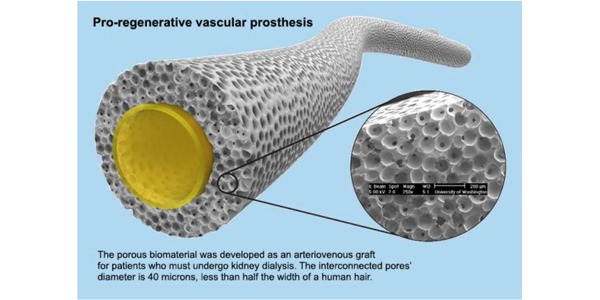Image credit, above: Le Zhen, UW Dept. of Chemical Engineering
Adapted from a UW Medicine news release.

Buddy Ratner, Ph.D.
UW bioengineer Buddy Ratner and his collaborators at Seattle’s Center for Dialysis Innovation (CDI) captured one of six prizes in a national contest to develop new solutions for dialysis care.
About 2 million people globally need the blood-cleansing therapy to survive.
“We’ve designed an arteriovenous, or AV, graft that we think will reduce surgical reoperations to replace failed conduits, thereby diminishing patient trauma and hospitalization costs,” said Dr. Ratner, who is also a professor of chemical engineering and CDI co-director. An AV graft connects an artery and a vein in a patient’s arm and makes inserting a needle for dialysis easier and more reliable.
KidneyX, short for Kidney Innovation Accelerator, is running several competitions to combat the growth of kidney disease and re-imagine the kidney dialysis process. The group is a joint effort of the U.S. Department of Health and Human Services and the American Society for Nephrology.
The CDI submitted two entries: a portable dialysis unit, which was a Phase I finalist, and the innovative AV graft, which as a Phase II winner earned $500,000 toward development. The Phase II contest sought prototype solutions, or components of solutions, that can replicate normal kidney functions or improve dialysis access.
Biomaterial heals in place
Using a biomaterial that Dr. Ratner’s lab invented in the 1990s that had tiny, interconnected pores – about half the width of a human hair – the interdisciplinary team created a prosthetic graft that can heal in place like a natural artery. They then implanted the engineered grafts in animal models.
“The test graft integrated so well into the (carotid) artery that it was nearly indistinguishable from original tissue,” Dr. Ratner said. “It was just what we wanted to see: blood vessels and healthy muscle tissue growing into these 40-micron pores.”
With a much lower failure rate, AV grafts could be “transformational” for dialysis patients, Dr. Ratner said. Dr. Ratner and CDI co-director Jonathan Himmelfarb, a UW Medicine nephrologist and bioengineering adjunct professor, have created a spinoff company that will pursue funding to thoroughly test the CDI’s prize-winning prototype.
The CDI is a collaboration of scientists and physicians at UW Medicine and Northwest Kidney Centers.
Learn more about the winning project:
A Pro-Regenerative Vascular Access Graft: Surmounting Challenges Inhibiting Progress, Buddy D. Ratner, PhD
Read more about the winning prototype AV graft design in the UW Medicine story:
Idea full of holes wins U.S. prize for kidney-dialysis team



